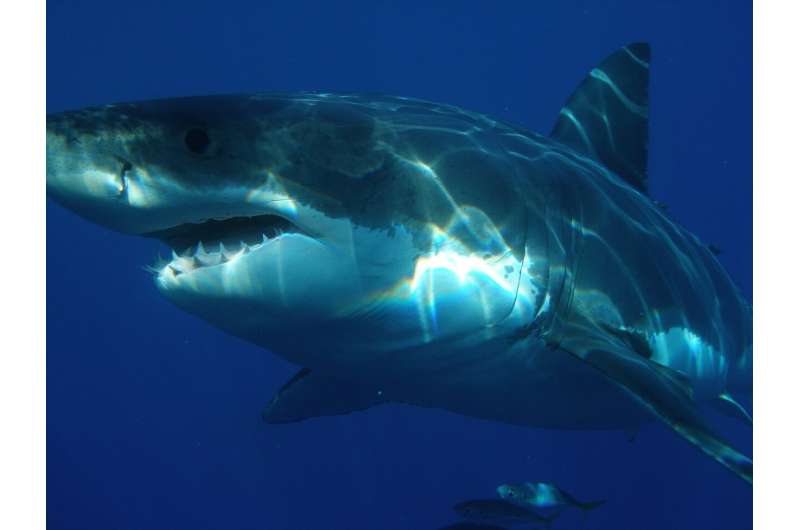This article has been reviewed according to Science X's editorial process and policies. Editors have highlighted the following attributes while ensuring the content's credibility:
fact-checked
peer-reviewed publication
reputable news agency
proofread
Study: 800 great white sharks have visited Cape Cod in recent years

A new population study of great white sharks off Cape Cod shows that the region is one of the largest white shark hotspots in the world, as the apex predators flock to the Cape to hunt seals.
Local shark researchers recently found that about 800 individual white sharks visited the waters off the Cape from 2015 to 2018. This count of 800 sharks is the first-ever estimate of white shark abundance in the North Atlantic Ocean.
The study was published on Thursday in the journal Marine Ecology Progress Series.
Megan Winton, lead author of the study and a staff scientist for the Atlantic White Shark Conservancy, had revealed this population estimate last month during a new National Geographic special for Sharkfest.
"Cape Cod is the only area in the region where researchers can feasibly monitor the population, and our estimates suggest that the Cape is among the larger white shark hotspots worldwide, which is good news from a conservation standpoint," Winton said.
The researchers found that white shark numbers along Cape Cod peaked in the late summer and early fall, when water temperatures are warmest, and declined as sharks migrate out of the area for the winter.
They found that the number of white sharks visiting the site increased over the duration of the survey, and estimated about 800 individuals visited the waters off Cape Cod from 2015 to 2018.
The team of scientists from the Atlantic White Shark Conservancy, University of Massachusetts Dartmouth's School for Marine Science and Technology, and the Massachusetts Division of Marine Fisheries conducted an intensive mark-recapture survey for the population study.
Mark-recapture methods use repeated surveys of uniquely marked animals to estimate population size. In the case of white sharks, individuals can be distinguished based on unique markings and notches in their dorsal fins.
From almost 3,000 videos collected during 137 research trips conducted off Cape Cod's beaches, the researchers identified 393 individual white sharks.
"By comparing the number of previously identified individuals to new individuals encountered over time, we were able to estimate the number of sharks visiting the site in each month of the survey, as well as the total for the four-year period," Winton said.
While the risk of a negative encounter with a shark is low, the increased presence and population of white sharks off Cape Cod underscores the need for ongoing research, public safety initiatives, and education programs in the region, the researchers said.
Greg Skomal, who leads the Massachusetts Division of Marine Fisheries' Shark Research Program, emphasized that it's important for the public to know that there are not hundreds of sharks swimming off Cape beaches all at the same time.
"Their movements are very dynamic, they trickle in and out," Skomal said. "Some white sharks simply stop by on their way north while others spend more time along the Cape, likely because they have success feeding on seals."
Journal information: Marine Ecology Progress Series
2023 MediaNews Group, Inc. Distributed by Tribune Content Agency, LLC.

















